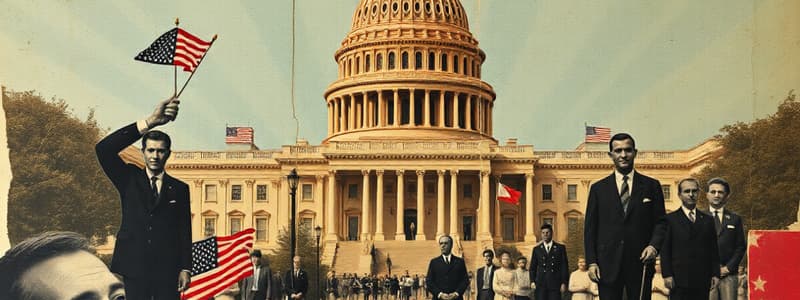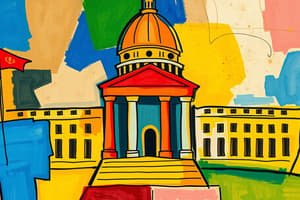Podcast
Questions and Answers
What does the slogan 'Taxation without representation' signify for the colonists?
What does the slogan 'Taxation without representation' signify for the colonists?
- They believed they should be represented in Parliament for any tax imposed. (correct)
- They supported British rule and all associated taxes.
- They wanted representation only for local issues.
- They were against all forms of taxation.
Which statement best describes the concept of 'unalienable rights'?
Which statement best describes the concept of 'unalienable rights'?
- Rights that can be modified by the government.
- Rights that are only applicable to certain groups within society.
- Inherent rights that cannot be taken away by the government. (correct)
- Rights that every citizen must earn through service.
What was one significant weakness of the Articles of Confederation?
What was one significant weakness of the Articles of Confederation?
- Each state held all the power with no centralized authority. (correct)
- It had a clear process for amending the constitution.
- The national government could levy taxes effectively.
- It allowed for a strong executive branch.
Which of the following describes the primary role of the separation of powers in government?
Which of the following describes the primary role of the separation of powers in government?
What was the cause and effect of Shays' Rebellion?
What was the cause and effect of Shays' Rebellion?
What is considered an obligation of U.S. citizens?
What is considered an obligation of U.S. citizens?
Which principle ensures that no one is above the law?
Which principle ensures that no one is above the law?
Which of the following is a step in the naturalization process?
Which of the following is a step in the naturalization process?
What is one of the responsibilities citizens should undertake?
What is one of the responsibilities citizens should undertake?
How does one acquire citizenship through the law of soil?
How does one acquire citizenship through the law of soil?
Which issue is addressed by the due process principle?
Which issue is addressed by the due process principle?
What is the role of the Selective Service System?
What is the role of the Selective Service System?
What is a characteristic of a citizen?
What is a characteristic of a citizen?
What is required of male U.S. citizens shortly after turning 18?
What is required of male U.S. citizens shortly after turning 18?
What does 'rule of law' signify in a democratic society?
What does 'rule of law' signify in a democratic society?
What does the Supremacy Clause establish?
What does the Supremacy Clause establish?
Which of the following is NOT a characteristic of the rule of law?
Which of the following is NOT a characteristic of the rule of law?
Which statement best describes democracy as a form of government?
Which statement best describes democracy as a form of government?
What is the purpose of the Bill of Rights?
What is the purpose of the Bill of Rights?
What political ideology emphasizes the idea of self-government?
What political ideology emphasizes the idea of self-government?
The ancient Greeks are credited with establishing what form of governance?
The ancient Greeks are credited with establishing what form of governance?
Flashcards
Rule of Law
Rule of Law
No one is above the law; laws are consistently applied and institutions are transparent.
Due Process
Due Process
Rights citizens have when accused of a crime.
Transparency
Transparency
Citizens can see what the government is doing.
Supremacy Clause
Supremacy Clause
Signup and view all the flashcards
Democracy
Democracy
Signup and view all the flashcards
Bill of Rights
Bill of Rights
Signup and view all the flashcards
Self-government
Self-government
Signup and view all the flashcards
Republican form of government
Republican form of government
Signup and view all the flashcards
Polis
Polis
Signup and view all the flashcards
Draft Registration
Draft Registration
Signup and view all the flashcards
Civics
Civics
Signup and view all the flashcards
Government
Government
Signup and view all the flashcards
Citizen
Citizen
Signup and view all the flashcards
U.S. Citizen Obligations
U.S. Citizen Obligations
Signup and view all the flashcards
U.S. Citizen Responsibilities
U.S. Citizen Responsibilities
Signup and view all the flashcards
Naturalization
Naturalization
Signup and view all the flashcards
Law of Blood
Law of Blood
Signup and view all the flashcards
Law of Soil
Law of Soil
Signup and view all the flashcards
Naturalization Process
Naturalization Process
Signup and view all the flashcards
Due Process
Due Process
Signup and view all the flashcards
Immigrant
Immigrant
Signup and view all the flashcards
Rule of Law
Rule of Law
Signup and view all the flashcards
Citizenship
Citizenship
Signup and view all the flashcards
Selective Service System
Selective Service System
Signup and view all the flashcards
Separation of Powers
Separation of Powers
Signup and view all the flashcards
Branches of Government
Branches of Government
Signup and view all the flashcards
Act
Act
Signup and view all the flashcards
Quartering Act
Quartering Act
Signup and view all the flashcards
Stamp Act
Stamp Act
Signup and view all the flashcards
Tea Act
Tea Act
Signup and view all the flashcards
Taxation without Representation
Taxation without Representation
Signup and view all the flashcards
Alter
Alter
Signup and view all the flashcards
Abolish
Abolish
Signup and view all the flashcards
Ratify
Ratify
Signup and view all the flashcards
Grievance
Grievance
Signup and view all the flashcards
Unalienable Rights
Unalienable Rights
Signup and view all the flashcards
Articles of Confederation
Articles of Confederation
Signup and view all the flashcards
Confederation
Confederation
Signup and view all the flashcards
Weaknesses of Articles of Confederation
Weaknesses of Articles of Confederation
Signup and view all the flashcards
Shays' Rebellion
Shays' Rebellion
Signup and view all the flashcards
Study Notes
Unit One: Civics
- Civics is the study of government and citizenship.
- Government is an organization that makes rules, settles disputes, and protects citizens.
- A citizen is a legally recognized member of a community.
- Key questions for the year include: what is the purpose and function of the U.S. and Florida government? and what are the responsibilities and obligations of a U.S. citizen?
- Citizens have rights but also obligations.
- U.S. Citizen Obligations (must do):
- Pay taxes
- Serve on a jury
- Obey the law
- Defend the nation (Selective Service System)
- U.S. Citizen Responsibilities (should do):
- Voting
- Staying informed
- Attending civic meetings
- Petitioning the government
- Running for office
- Performing community service
Naturalization
- Naturalization is the process of becoming a citizen of a country.
- Law of Blood: A person's citizenship is determined by their parents' citizenship.
- Law of Soil: A person's citizenship is determined by their place of birth.
- Process for Naturalization:
- Be at least 18 years old
- Have lived in the U.S. legally for 5 years
- Apply for naturalization
- Be a good citizen
- Pass an interview and test
- Take the oath of allegiance to the U.S. Constitution
Rule of Law
- Rule of law: No one is above the law.
- Due process: Principle that no person can be deprived of life, liberty, or property without fair legal procedures.
- Citizenship: Legal membership in a state or country.
Transparency and Authority
- Transparency: Citizens can understand what the government is doing.
- Arbitrary: Unrestrained and autocratic use of authority.
- Characteristics of rule of law: consistent application of the law, decisions based on the law, and transparency of institutions.
Supremacy Clause
- U.S. Constitution is the supreme law of the land.
- No state laws can conflict with the U.S. Constitution.
Democracy and Power
- Democracy: People have the power.
- We the People: First three words of the U.S. Constitution.
Unit Two: Historical Influences
- Ancient Greeks established the world's first direct democracies.
- Polis: Self-governing communities in ancient Greece.
- Self-government: The idea that the people are the source of governmental power.
- Ancient Rome: Developed a form of representative democracy.
- Republican form of government: The people choose leaders to represent their interests.
- Bill of Rights: First 10 amendments to the U.S. Constitution, protecting individual rights and freedoms.
- Tyranny: Cruel and oppressive ruler.
Judeo-Christian Tradition
- Values and virtues like equality, individual worth, justice, and responsibility.
Civic Participation
- Involvement in local, state, and national government activities such as voting, activism, and community involvement.
Historical Documents, Influences, and Concepts
- Magna Carta (1215): Laws created by the citizens of England to limit the monarch's power.
- Mayflower Compact (1620): Example of self-government.
- English Bill of Rights (1689): Influenced the Founding Fathers.
- Thomas Paine's Common Sense (1776): Pamphlet advocating for colonial independence.
Enlightenment
- Period of new ideas about human existence, including basic rights and control over government.
- Enlightenment thinkers believed that human beings are born with natural rights (life, liberty, property, pursuit of happiness).
- Social contract: citizens give up some freedom to secure rights and protections by a government.
- Republicanism: Leader elected by the citizen body
- John Locke: Imagined natural rights (life, liberty, and property). Influenced Thomas Jefferson in writing the Declaration of Independence.
Events Leading to the U.S. Constitution
- Acts: Laws passed by the British government
- Quartering Act, Stamp Act, Tea Act: Examples of disputes over colonial rights and taxation
- Taxation without representation: Colonists' opposition to taxes without a voice in Parliament.
- Grievances: Complaints of unfair treatment
- Unalienable rights: Rights that cannot be taken away from citizens.
Articles of Confederation
- First U.S. constitution.
- States held most power.
- Central government was weak.
- Shays' Rebellion: Revolt by farmers in Massachusetts that highlighted the weakness of the central government.
Studying That Suits You
Use AI to generate personalized quizzes and flashcards to suit your learning preferences.
Related Documents
Description
This quiz explores the fundamental concepts of civics, including the roles of government, the rights and responsibilities of U.S. citizens, and the naturalization process. It addresses key questions regarding the purpose of government and citizen obligations. Test your knowledge on these essential civic concepts.




